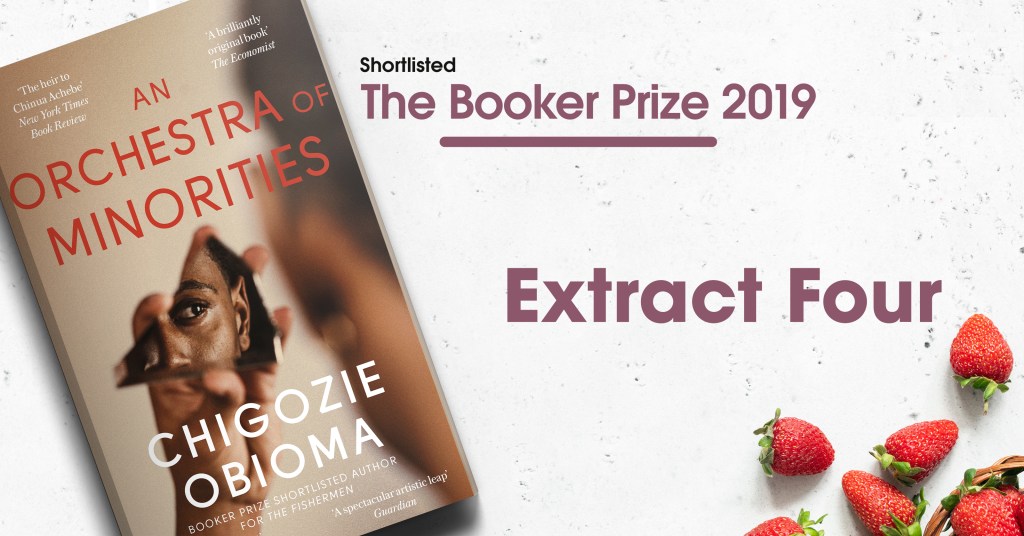An Orchestra of Minorities: Extract #4

AKWAAKWURU, he woke to the wild noises of his crowd of fowls the following morning. One of them was crowing without cease, letting its voice ebb at intervals, then beginning again in a higher pitch than before. He pushed aside the wrappa he’d covered himself in and was starting to step out of the door when he realised he was naked. He put on shorts and a wrinkled shirt and went to the backyard. He emptied the last contents of a bag of mash into a bowl and set the bowl at the centre of the yard on an old newspaper page. When he unlocked one of the cages, the birds flung themselves at him at once, and in the batting of an eye, the bowl was covered in a goo of feathery beings.
He stepped back, his eyes scanning them for signs of anything out of the ordinary. He watched one of the hens especially, the one whose wing had caught an errant nail sticking out of one of the cages. The bird had tried to pull itself away from the nail so hard that it had almost ripped out its wing. He’d stitched the wing with a thread the previous week, and now the bird participated in the scramble for the mash with cautious gait, the red thread of the stitching visible beneath its wing. He picked up the hen by its legs. He checked its wings, tracing his fingers around the veins on the end. As he made to drop it, his phone rang. He ran into the house to get it. But by the time he got into the living room, the ringing had stopped. He saw that Ndali had just called him and sent a text message. He hesitated at first to read it – as if he feared that what he would read on the screen would remain for eternity unerasable. He dropped the phone back on the dining table, placed his palm on his forehead, and gnashed his teeth. I could see that he had become sick from the head wound of the previous day. From the top of the refrigerator, he took a sachet of paracetamol and ejected one of the remaining two tablets into his palm. He placed the medicine on his tongue, went into the kitchen, and washed it down with water from a plastic jug.
He picked up the phone again and read the message: Nonso, should I come and visit you in the evening? Chukwu, he smiled to himself, pumped his fist into the air, and shouted ‘Yes!’ He dropped the phone into his pocket and was almost back in the yard when he remembered he’d merely answered in speech as if she were there with him. He stood by the net door to the yard and typed ‘yes’ into his phone.
Lit with the prospect of meeting Ndali, he gathered some eggs and placed them in the egg- shaped holes on a plastic crate. Then he took hold of the wounded bird once more. Its eyes blinked with fear, its beak opening and closing as he rubbed its head and examined its wings to see if it could accommodate flight. He cleaned the mash tray and placed some mash on it. Something like a half- broken toothpick stuck out of the feed. He picked it up and threw it behind him. Then, on second thought, fearing one of the fowls might find it there and swallow it, he rose and began looking for the stick. He found it just near one of the cages, the one for the small chicks. The stick was on the wet edge of the slab of wood on which he’d placed the cage. He picked it up and threw the stick over the fence into the dump outside his compound. Then he tucked the tray of mash into the bed of one of the two cages.
By the time he finished feeding the poultry, his hands were almost black with dirt. Dark grime lay in his fingernails, and the flesh of his right thumb looked barbed and was lined with welts. One of the eggs he’d picked was coated with a stiff encrustation of faeces, which he tried to scratch off with his fingers, and it was the crust of faeces that he now carried in his fingernails. As he washed his hands in the bathroom, he was thinking about how odd his work was and how lowly it seemed to be to one newly encountering it. He feared that Ndali may not come to love it or might even be irritated by it if she came to really understand the nature of his work.
Chukwu, as I said before, this kind of fear- induced rumination often occurs when people have been made self- conscious by the presence of others whom they hold in high esteem. They assess themselves by focusing on how others would perceive them. In such situations, there may be no limit to the self- defeating thoughts that may form in the person’s mind, which – no matter how unfounded – may consume them in the end. My host did not, however, dwell on these thoughts for too long. He was, instead, in a haste to prepare for Ndali’s visit. He swept the house and the balcony clean. Then he dusted the cushions and sofas. He washed the toilet bowl and sprayed Izal into it and cleaned out the rat faeces behind the water drum.
He threw away one of the plastic buckets, a paint bucket that had cracked in several places. Then he sprayed air freshener around the house. He’d just finished bathing and was creaming his body when, through the window, he saw her car coming towards the house, flanked on both sides by the plantations.
Ijango- ijango, my host felt his body lit with admiration at her appearance that evening. Her hair was dressed in a way the great mothers would have found strange but which made it shiny and attractive to my host. He gazed closely at the neatly permed hair, her wristwatch, the bangles around her wrist, the necklace with green beads that reminded him of his own mother’s sister, Ifemia, who lived in Lagos and with whom he’d long since lost contact. Although he’d already begun to feel unworthy of Ndali because of his lack of exposure (he had never been to a club before, or to a theatre), he sank even lower in his own estimation when he saw her that evening. Although she engaged him with utmost geniality and affection, he stood with a strong feeling of unworthiness. So he attended their conversations like one forced to be there, saying only what was needed and what was prompted.
‘Did you always want to be a poultry farmer?’ Ndali said at one point, later than he’d expected, deepening his fear that in the end, she would not give herself to him.
He nodded, then it occurred to him that that might be a lie. So he said, ‘Maybe, no, Mommy. My father started the idea, not me.’
‘The poultry?’
‘Yes.’
She gazed on at him, a restrained smile on her face.
‘How? But how?’ she said.
‘It’s a long story, Mommy.’
‘God! Ah, I want to hear it. Please tell me.’
He looked up at her and said, ‘Okay, Mommy.’
Ebubedike, he told her about the gosling, beginning with how it was caught when he was only nine years old, an encounter which changed his life, and which I must relate to you now. His father took him from the city to his village one day and told him to sleep, that in the morning he would take him into the Ogbuti forest, where a species of wool- white geese lived near a hidden pool in the very heart of the forest. Most hunters avoided this part of the forest for fear of deadly snakes and wild beasts. The pool was a tributary of the Imo River. I have seen it many times. Long ago, before Aro slave raiders began sweeping this part of Alaigbo, the river used to flow. But it was cut off by an earthquake which separated it from the rest of the river and made it into a stagnant body of water that became the home of the white geese. They had lived there for as long as anyone in the nine villages that surround the forest could remember.
When my host and his father, who carried a long Dane gun, got to this spot, they stopped behind the stump of a rotting fallen trunk covered by grass and wild mushrooms. Two stone throws from the trunk was the dead pool, half covered with leaves. Beside it was a riparian stretch of matted, damp land strewn with splinters of wood. It was here that a flock of white geese was gathered, grazing. As if alerted to the human presence, most of the flock whipped their wings and flew into the denser part of the forest, leaving only a mother goose and her offspring and another big goose in the field. The third goose leapt a few times and began floating across the distant waters until it reached the reef, then it vanished into the greenery. My host observed the mother goose with fascination. Its plumage was rich and its tails serrated downwards. Its eyes were wide and it had a brown beak with nares. When it moved, it spread its wings into a cascading flourish. The gosling beside it was different: its neck was longer and bare at the top, as if plucked. It tottered forward on its tiny feet after its mother, who’d begun moving away from the nestling. My host’s father had brought his gun to bear and would have shot it if a perplexing vision had not suddenly presented itself. The mother goose, who had stopped in a place of soft earth so that her feet sank into the mud, was now waiting with her mouth wide- open. The gosling, clattering, approached and buried its head into the waiting mouth till part of its neck disappeared.
My host and his father watched in wonder as the gosling’s head and neck probed into its mother’s mouth. As the child fed, its mother struggled for balance. She dug her feet deeper into the clump of mud, fluttering her wings violently, stepping back with steady haste, her claws folding and unclasping. For a moment, it seemed to my host that the big goose’s throat might tear open as the little bird gorged greedily within it. The movement of the gosling’s beak could be glimpsed through the pale skin of its mother’s throat. It came almost as a surprise to my host when the gosling disentangled itself and began sprinting away, fluttering its wings and full of life like one reborn. Its mother turned her head, gave a cry, and seemed to fall on her legs. Then she rose, caked in a half cloth of mud, and began racing in the direction where my host and his father were crouched.
The bird was close when his father took aim. The shot flung the goose backwards with a loud noise, leaving in its wake an explosion of feathers. The forest erupted into a hysteria of fleeing creatures and a chorus of fluttering wings. As the feathers settled, my host saw the gosling hurrying towards its mother’s body.
‘I did it, I finally shot an Ogbuti goose,’ his father said, as he stood up and began running towards the dead goose. My host followed at a cautious pace, speechless. His father picked up the dead goose, exhilarated, and began walking in the direction from which they had come, the blood of the dead goose marking his trail. His father did not notice the gosling scampering along after him, making a shrilling sound which, many years later, my host would realise was the sound of a weeping bird. He stood still, listening to his father talk about how for years he’d longed to catch an Ogbuti forest goose – ‘always said no one knew where they lived. How could anyone know? Only a few people will ever venture this far into the Ogbuti. People only saw them in the air. And, you know, it is very hard to shoot something in the air. This—’ – until his father, turning abruptly, saw him standing back, afar.
‘Chinonso?’ his father said.
He looked up with a pout, his eyes near tears. ‘Sir,’ he said in the language of the White Man.
‘What? What is it?’
He pointed at the gosling. His father looked down and saw the gosling moving its legs in the swamp, its eyes fixed on the two humans as it wept for its dead mother.
‘Heh, why don’t you pick it up and bring it home?’
My host walked towards his father and stopped behind the bird.
‘Why don’t you keep him?’ his father said again.
He glanced at the bird, then at his father, and something lit up in him.
‘Can I bring it to Umuahia?’
Uh,’ his father said, and turned back again to the path from which they had come with the dead goose, whose body was now half covered in crimson in his hand. ‘Now catch it, and let’s go.’
With hesitation, dragging his feet, he dived forward and caught the gosling by its thin legs. The bird mourned plaintively, beating its wings against the tender hands that held it. But he tightened his grip around its legs as he lifted it from the ground. He looked up at his father, who was waiting, blood dripping from the dead goose in his hand.
‘It is yours now,’ his father said. ‘You have saved it. Take it and let us go.’ Then turning, his father began walking back to the village, and he followed.
He then told her about how he loved the bird. The bird often flew into moods of rage, then calmed and lifted its spirit. It would sometimes make a mad dash towards nothing, perhaps intent to return to the forest from which it’d come. And when it saw no chance of escape it would circle back in defeat. He watched over it closely, with anxiety. He lived in perpetual fear that something bad would happen to the bird or that it might some day escape from him. This fear was most pronounced in the times when the gosling would, in anger, begin dashing about the house, from wall to wall, trying to break through it and flee. And after every such struggle, it would return to a chair or a table, its head bent as in some kind of prostration. It would hold its wings suspended as it cawed in fury or frustration.
‘Yes,’ he said in answer to her question: there were times the gosling was calm. He knew that it was in the nature of earthly creatures that even the most wounded of them is sometimes peaceful in captivity. These were times when the gosling slept in his bed, by his side, as though it were a human companion. When he first came to Umuahia with the gosling, the children of the neighbourhood flocked to see it. At first, he guarded it jealously, not allowing anyone to touch the raffia cage in which he kept the bird. He would even fight with some of his friends who lived around the neighbourhood and played football with him if they tried to touch it without his permission. One of them, Ejike, with whom he’d been best friends, was particularly enamoured of the bird. Ejike sought it more than the others, and, in time, my host allowed him to play with it often. Then one day, Ejike asked to take the gosling to his house so he could show it to his grandmother, saying, ‘For five minutes, only five minutes.’ Oseburuwa, I had seen the look in the eyes of this child, and I’d feared that in them, deep within, I could see the small flame of envy burning. For I have seen it many times in the children of men: that negative side of admiration that has caused many murders and dark conspiracies. I flashed it in my host’s mind that he should not give away the gosling. But he would not hear me. He gave the bird to his friend, confident no harm would come to the bird.
Ejike took the gosling away. When by sunset he still had not returned it, my host became anxious. He went to Ejike’s house and knocked on the door of the flat Ejike and his mother occupied, but heard nothing. He called Ejike’s name many times, but received no answer. The door was bolted from within. But from the outside, he could hear the bird squawking and the sound of its wings as it glided about even with the twine that was wound around its legs. He rushed back home and sought his father. Together they went to the house, but even though this time Ejike’s mother answered the door, she denied that they had the gosling.
This woman, whose husband had died, had once lured his father into her house and they had copulated. But not wanting to fill the place of his loving wife, for whom he would grieve for the rest of his life, his father had refused to continue the relationship. And this had put a wedge between him and the woman. Although my host did not know this, I did, for I’d heard his father talk about it to himself while my host was asleep. And one night, I’d seen his father’s chi – a carefree chi who often floated with etheric flamboyance while lurking about the house – and it told me that it had left the body of its host because he was about to have sex with the neighbour. It said my host’s father and the woman were fondling at the back of the house, in the yard. I had come to know this guardian spirit very well, as one often knows the guardian spirits of other members of a household. Peer into a household at midnight, and you’ll find guardian spirits – usually of males – conversing or simply moving about the house, often developing a bond with each other over the lifetimes of their hosts. This is how I came to know a great many guardian spirits of the males and females of mankind.
So on this day, perhaps because of the hurt she still harboured, the woman slammed the door in the face of my host and his father.
There was nothing my host could do to Ejike and his mother after that. He was stunned for days and would sometimes descend into uncontrolled rage and dart towards the neighbour’s house, but his father would call him back and threaten to whip him if he went back there. He listened every minute for the gosling, refusing to eat, and hardly sleeping at night. It was difficult for me, his guardian spirit, to watch him suffer. But there is nothing a chi can do to help a man in a circumstance such as this, as we have limitations. The old fathers, in their wisdom, say Onye ka nmadu ka chi ya, and they are right. A person who is greater than another is also greater than his chi. Thus, there is little a chi can do for a man whose spirit is broken.
Egbunu, Ndali was moved by this part of his tale. Although she spoke throughout his story, asking questions (‘He said that?’; ‘So what happened next?’; ‘Did you see it?’), I’ve decided not to relate them, as I must focus on this tale about this creature to whom my host once gave his heart. But in light of the things that have now happened and the reason for which I stand before you to testify about my host, I must relate her speech at this point in the story in which my host’s desire to get back that which belonged to him had sent him to the edge of madness. Shaking her head wearily, she’d said, ‘It must be very sad, a bird that is yours, which you suffered for, taken away just like that. It must be painful.’ He merely nodded and continued. He told her that by the fifth day, he’d become desperate. He climbed the tree in the backyard, and from there he gained a view into the compound of the neighbour. He saw Ejike seated on a stool behind their fenced house stroking the gosling. At first, the goose had appeared dead, then he saw its wings flutter as it tried to fly away from its captor who quickly stamped his foot on the red leash fastened to its leg. The gosling struggled, raised its leg again and again and flapped its wings, but the twine held it still. It was as my host watched this that the cruel idea came into his mind.
Chukwu, the moment I glimpsed the design of his heart, I contested it. I flashed the thought in his mind to think of the devastation and pain that would come to him should he proceed. He considered it momentarily and even imagined the bird bleeding from the gash inflicted by the stone on its head, and it frightened him. Yet he brushed the thought away. But as you know, a chi cannot go against the will of its host, nor can it compel its host against his will. This is why the old fathers say that if a man is silent, his chi also becomes silent. This is the universal law of guardian spirits: a man must will for his chi to act. Thus was I thrust into a difficult situation in which I would watch helplessly as he did something that would bring him anguish in the end. He returned with his catapult, sat on a bowed branch, and concealed himself in its foliage. From there he saw the bird fastened to the leg of the stool on which Ejike had sat only a moment before going back into his house.
At this point in his story, my host saw that he was about to tell Ndali that he was capable of serious violence, so he paused the narration to lie to her and say that he’d stopped loving the gosling because it was no longer his. He told her that because it was attached to Ejike, he’d thought of killing it as revenge against its new master. When she nodded and said, ‘I understand, go on,’ he told her about how he shot at the bird with the stone without missing. It hit it on the shank, then it fell and let out what must have been a cry of pain. He rushed down the tree, his heart having become a beating drum. He ran into his room, and later, Ejike came rushing down with the bleeding bird, crying that it was going to die if it did not get treatment. Indeed, days later, after he had reclaimed the bird and brought it back into his house, he woke to find the bird lying in the centre of his room on its back, its small wings clasped tightly against its body, its head slumped by its side. Its two legs were firm and lifeless, their claws curving downwards with the early strain of rigor mortis.
Gaganaogwu, the death of the bird disturbed my host very much. He told Ndali how he’d mourned the loss and had become so harsh on himself that his father was forced to punish him. But it yielded nothing. Complaints began to tide in from his school of his inattention and constant truancy. Such was his revolt that he acted to provoke punishments, and he took them – especially the floggings – with a masochistic indifference that alarmed his teachers. They sent word to his father, who by then had grown weary of punishing him because he had changed from being a plump boy to a slender one. One day, in a desperate attempt to save his son, his father took him to a poultry farm outside the city. My host described the big farm to Ndali in detail: the hundreds of birds before his eyes – domesticated birds of different kinds. It was here, among the smell of a thousand feathers and the clucking of hundreds of voices, that his heart finally lifted within him and came back to life. His father and he returned with a cage full of chickens and two turkeys, and the poultry business began.
Shortlisted for the Booker Prize 2019, An Orchestra of Minorities is a heart-wrenching epic about the tension between fate and free well.






